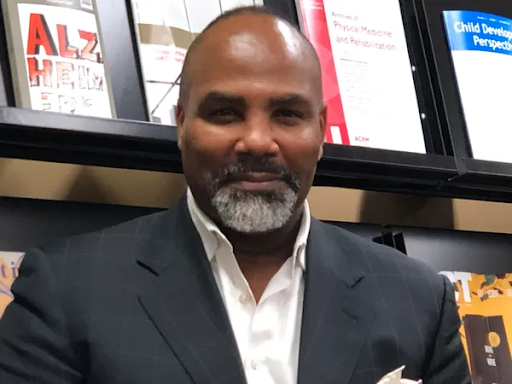Professor Profile: Dr. Clemmie Harris

Dr. Clemmie Harris has been at Utica University for the past five years.
March 13, 2022
History is a discipline that looks at the past. However, one Utica University professor strives to connect history to the present day and uses it as an example for a lot of his lectures and research. That professor is Dr. Clemmie Harris.
“History is more than just the study of the past in many ways,” Harris said. “History is also the study of the present and how it’s still affected by the past.”
Harris is an associate professor of history and also the director of Africana Studies at Utica University. He earned his Ph.D in American History, Africana Studies, Metropolitan Studies and Public Affairs from the University of Pennsylvania in Philadelphia and his M.A. in American History from University of Pennsylvania and SUNY Albany, as well as a B.A. from SUNY Albany.
Before arriving at Utica University in 2017, Harris taught as a visiting assistant professor in African American Studies and Public Affairs at Syracuse University and Wesleyan University.
Harris’s area of expertise focuses on Africana studies. He teaches classes such as the African American Experience and North Africa, Islam and the Middle East in Historical Perspective. During this academic year, he even began a new class on the topic of Black Women, Gender and Transnationalism.
“When it comes to history, many subjects are difficult to talk about,” Harris said. “I feel it is my job to not only educate, but to expand the minds of my students on these subjects to the best of my ability.”
During his time at Utica, Harris has held several lectures or keynote presentations, including PioTalks. These lectures have covered topics like the history of race and racism in the public health system and most recently the Kyle Rittenhouse case.
A recent lecture, which took place on Feb. 23, explained how the Rittenhouse case had little to do with “self defense” and more to do with an unresolved history of racial violence, whiteness and American retrenchment to civil rights.
“By training, I am an urban historian of African American social and political history during the 20th century, as well as a scholar of the long Black freedom struggle in the urban North,” Harris said. “This facilitates development of critical analysis through which we can see strong connections between the past, key elements of the Kyle Rittenhouse case.”
For students studying history, the best advice Harris said he could give was to make sure to understand that some topics may get uncomfortable, but at the same time, an uncomfortable experience will help you grow as a person. The major can also help expand a number of marketable skills.
According to Harris, anyone looking to sharpen their critical thinking skills, as well as critical training in reading, writing and speaking, should consider a minor in Africana Studies or History. Those disciplines are universally marketable when pursuing professional careers, and help develop an understanding of the complex challenges Americans face in today’s global society.
Harris said before giving the Kyle Rittenhouse lecture to Utica, he presented it the previous night online for Yale University.
“I was asked after by a friend if I ever saw the faces of the people who tuned in online to listen and I said no,” said Harris. “He told me after just how mesmerized they were by the lecture and it was a good feeling.”
Many students at Utica University have expressed much pleasure after attending Harris’s lectures, finding them educational and eye-opening.
“One thing that I like about Dr. Harris’s lectures is he shows lots of detail in each slide,” student Crystal Santiago said. “It seems like that he is always putting history in his own words and experiences and it has been a pleasure learning more about his perspective of Black history.”


















![President Todd Pfannestiel poses with Jeremy Thurston chairperson Board of Trustees [left] and former chairperson Robert Brvenik [right] after accepting the university's institutional charter.](https://uticatangerine.com/wp-content/uploads/2023/10/unnamed.jpeg)



















































































































